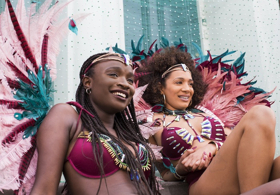Guest Blog: Playwright Yasmin Joseph On J'OUVERT at Theatre503

It was 2015, and I'd just moved to New York to intern for a theatre venue in Manhattan.
I arrived in the city just before Labor Day, the city's annual West Indian Parade, and was dropped off to stay at a family friend's home in Flatbush. Feeling completely overwhelmed and really far from home, it was immediately reassuring hearing Soca music blaring loudly outside. It signified that my community of Black people and Caribbeans were nearby; this meant home and safety.
So, when the bass continued to rattle through my (very thin) walls way into the early hours, it felt instinctive to go outside and explore. It was J'Ouvert morning - the dawn of Carnival celebrations - and strolling through the streets of Brooklyn seeing people dance and be their whole selves, I'd found somewhere I could fit.
It was only in the days following, when I shared my experience with colleagues and friends, that I got a sense of the potential danger I'd placed myself in. A year later in 2016, I would learn of Tiarah Poyau, shot and killed during J'Ouvert celebrations in Brooklyn for declining the advances of a man she didn't want to dance with.
Growing up, Carnival always felt like a birthright or rite of passage to me. In my family, your real coming-of-age defining moment was when you were allowed to go alone. As a child, my mum worked at the Avenues Youth Club on Harrow Road.
%20%20(2).jpg)
A staple part of our summer holidays included ferrying sequins and feathers to her sessions where she'd design and create costumes for the children to wear on their float at Notting Hill. We'd stay up with her as she tie-dyed and screen-printed T-shirts to sell on the Monday. I was often put to sit on speakers, where I'd watch the masqueraders dance until I fell asleep.
Carnival and Black womanhood have always been synonymous to me. Black women's roles as the innovators, entrepreneurs and performers is at the forefront of my cultural relationship with Carnival. Writing my debut play J'Ouvert was my way of reconciling with the way that Black women are often mistreated in the spaces that they pioneer.
As an adult, I've found my experiences at Notting Hill Carnival conflicting; at my core, I value its power as a vital act of resistance - a space of joy, freedom and uninhibited expression. I'm prepared to fight to the bone against its constant threat of erasure, disproportionate racial policing and unfair coverage in the media. On the other hand, I'm tired of the groping, grabbing and disrespect - people labelling everything from grass to chicken with "jerk", then pricing it at £8, and the general disregard for the history that Carnival was birthed from.
J'Ouvert explores this conflict. It touches on themes such as protest and resistance, misogyny and the power of sisterhood. It's a story about two young Black women at Notting Hill Carnival, fighting for a space they thought was theirs, and as they journey through the day and examine changes in their community, they are forced to reexamine what connects them to their culture and to each other; it represents the experiences of Black women who dare to be heard and seen.
I've purposefully constructed the creative team behind J'Ouvert to ensure that everyone in the room has a personal stake in the story, whether it's the stage manager, who has grown up in West London, or the director that's a regular Carnival-goer. I wanted this debut to be completely unapologetic, and for us to have complete ownership. Notting Hill Carnival encompasses so much, and exploring it through the lens of a familiar and relatable friendship between two young Black women highlights how much the personal can be political.
J'Ouvert itself embodies all the aspects of Carnival: it is musical, it is physical, it is joyous, it is crowded, it is loud and vibrant and colourful, and it invites the audience in to dance and move and feel with us.
Transforming Theatre503 into the streets of Notting Hill Carnival is very much about recreating the community that pulls me to Carnival every year and ensuring those communities get to access this work, whilst paying homage to the Black women that have built Carnival, and the Black women who work to keep it going.
J'Ouvert at Theatre503 29 May-22 June
Photo credit: Krystal Neuville
Comments
Videos

